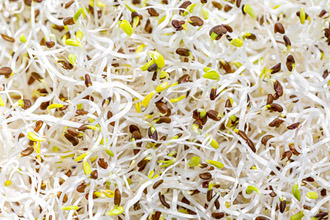Alfalfa Sprouts Nutrition facts
Alfalfa sprouts are germinated alfalfa seeds. The sprouts are one of the widely used bean sprouts employed in salads and toppings in the United States attributable to their low-calorie content and exceptional nutritional value.
Alfalfa seeds, botanically classified as Medicago sativa, are the tiny, brown color seeds of an herbaceous perennial belonging to the Fabaceae or pea family.
 |
| Fresh alfalfa sprouts Photo: Marco Verch. |
When sprouting, the seeds give rise to slender shoots, with one set of small leaves, averaging 5 to 12 centimeters in length. The sprouts have thin, delicate, flexible, and succulent white stems with a crisp texture.
The slender alfalfa shoots are typically gathered within 3 to 5 days after sprouting before reaching maturity to avoid the development of a bitter flavor characteristic of fully grown Alfalfa leaves, which are not commonly consumed.
Health benefits of Alfalfa sprouts
Alfalfa sprouts are very nutritious and low-calorie items. the sprouts carry just 23 cal/100 g (3.5 oz) servings in contrast with 32 cal/100 g of mung bean sprouts. Their calorie-value can be compared to that of leafy-greens like salad rocket (25 calories/100 g).
Sprouted Alfalfa seeds are rich in dietary fiber but low-fat and cholesterol-free food items.
3.5 oz (100 grams) servings of alfalfa sprouts hold 3.99 g or 7% of the recommended daily values of protein.
Dietary fiber content in fresh sprouts adds bulk to the stool, softens it, and speeds up its passage through the digestive tract. This can help in the elimination of waste and toxins from the colon, potentially reducing the exposure of the colon lining to harmful substances, thereby lowering the risk of colon cancer.
Soluble fiber has been known to reduce LDL (low-density lipoprotein) cholesterol levels in the blood by interfering with the absorption of cholesterol in the intestines, including the reabsorption of cholesterol-containing bile acids in the colon. This process helps to expel cholesterol from the body, contributing to the reduction of LDL cholesterol levels.
Alfalfa sprouts digest easily and are free from gluten. As gluten-free food alternatives, the sprouts well received in gluten-allergy and celiac disease patients.
Alfalfa sprouts carry good amounts of B-complex vitamins, especially folates (36 μg- 9% of DI), thiamin, pyridoxine, pantothenic acid, riboflavin, and niacin. Most of these vitamins work as co-factors for the enzymes in carbohydrate, protein, and fat metabolism.
Germination enhances folate levels in the sprouted alfalfa beans. Folate, together with vitamin B-12, is one of the essential co-factors for DNA synthesis and cell division. Adequate folate in the diet around conception and during pregnancy may help prevent neural tube defects in newborn babies.
Fresh alfalfa sprouts carry a good amount of vitamin C (8.2 mg or 9% DI). Vitamin C is an essential antioxidant that supports the immune system and helps in the absorption of iron.
Additionally, they are moderately good sources of several essential minerals. 100 g of sprouts contain relatively good levels of copper, iron (12% DI), manganese (7% DI), phosphorus (11% DI), calcium, and zinc.
They are also very good sources of heart-friendly electrolyte, potassium. Potassium is present inside cells and body fluids, which counters the pressing effects of sodium on the heart and thereby decreases blood pressure.
| Principle | Nutrient Value | Percent of RDA |
|---|---|---|
| Energy | 23 Kcal | 1.5% |
| Carbohydrates | 2.1 Kcal | 1.6% |
| Protein | 3.99 g | 7% |
| Total Fat | 0.69 g | 3.5% |
| Cholesterol | 0 mg | 0% |
| Dietary Fiber | 1.9 g | 5% |
| Vitamins | ||
| Folates | 36 μg | 9% |
| Niacin | 0.481 mg | 3% |
| Pyridoxine | 0.034 mg | 2.5% |
| Riboflavin | 0.126 mg | 9.5% |
| Thiamin | 0.076 mg | 6.3% |
| Vitamin-A | 155 IU | 5% |
| Vitamin-C | 8.2 mg | 9% |
| Electrolytes | ||
| Sodium | 6 mg | <1% |
| Potassium | 79 mg | 1.7% |
| Minerals | ||
| Calcium | 32 mg | 3% |
| Copper | 0.157 μg | 17% |
| Iron | 0.96 mg | 12% |
| Magnesium | 27 mg | 7% |
| Manganese | 0.188 mg | 8% |
| Phosphorus | 79 mg | 11% |
| Selenium | 0.6 μg | 1% |
| Zinc | 0.92 mg | 8% |
| Phyto-nutrients | ||
| Carotene-β | 87 μg | - |
Methods of sprouting alfalfa seeds
Add 2 tablespoons of cleaned alfalfa seeds in ½ cup cool water in a bowl and soak for 8 hours or overnight.
Drain all water off the alfalfa seeds and transfer the soaked seeds onto a sprouting container.
Rinse and drain alfalfa seeds and repeat 2-3 times a day until harvest.
Tiny sprouts should begin to form in about 3 days. Once sprout tails appear, move the sprout container to indirect light for growing green leaves. Avoid direct sunlight.
Continue rinsing and draining 2-3 times daily until sprouts have grown to around 3 inches.
Once sprouts have reached the desired length, drain well, remove any remaining hulls, and add in the dishes.
Check for uniform sprout growth.
Place a well-established sprout pack in a clean container and keep it in the refrigerator to restrict further growth of sprouts.
Buying
Most households prepare alfalfa sprouts at home. If not, then one can procure them from trusted grocery stores known for stocking fresh, top-quality vegetables. Look for sprouts with healthy white stems and green tops.
Avoid any sprouts whose stems are brown or appear mushy as these may indicate spoilage.
Storing
Alfalfa sprouts are highly perishable in nature and for safety reasons they should be handled properly to avoid bacterial contamination.
Here are some storing tips:
Alfalfa sprouts have a relatively short shelf life, typically lasting around 2 to 5 days in the refrigerator. Therefore, consume them as fresh as possible for the best taste and texture.
Before storing, ensure the sprouts are thoroughly rinsed in cold water and then dried using a salad spinner or paper towels. Excess moisture can lead to spoilage.
Place the dried alfalfa sprouts in a clean, airtight container or a resealable plastic bag.
Store the container or bag of alfalfa sprouts in the refrigerator, usually the crisper drawer where the temperature is a bit more consistent.
Do not freeze alfalfa sprouts as it can compromise their texture and flavor.
Check the sprouts periodically for any signs of spoilage, and remove any mushy or discolored ones promptly to prevent them from affecting the rest.
NHS-Food Standards Agency says "you should not eat sprouts that are past their use by date and should avoid using sprouts that have turned brown or changed color".
Preparation and serving methods
It is important to note that Alfalfa sprouts can contain food-borne bacteria such as salmonella and E. coli. Warning signs include any indication of mold, excessive moisture, browning or yellowing of stems, a mushy appearance, or smells that suggest the sprouts might be spoiled. Sprouts that show any of these characteristics should be promptly discarded.
For consumers, the U.S- FDA suggests the following tips to reduce the risk of foodborne illness when handling and consuming sprouts:
Preparation: Rinse sprouts thoroughly under running water before use, even if they're labeled as "prewashed" or "ready-to-eat." This step helps reduce bacteria that may be present.
Cooking: Cooking sprouts thoroughly can help kill any harmful bacteria. Consider cooking them in stir-fries, soups, or other dishes to reduce the risk of illness.
Sprouts continue to grow while stored. At home, soak fresh sprouts in water and drain to remove metabolite that would have surfaced while storing.
Cleaned sprouts can be eaten raw, added in salads, and in cooking. Avoid overcooking.
Here are some serving tips:
 |
| Burger- Alfalfa sprouts. Photo credit: Lindsay Evans |
Alfalfa sprouts add texture, moisture, and a delicate crispiness to a variety of raw or cooked dishes.
Add freshly-grown alfalfa sprouts into salads and coleslaws, or spring rolls.
Add fresh alfalfa sprouts within sandwiches, burgers, wraps, or spread them over toast for an added layer of flavor.
Use them as a topping for tacos, pasta, or pizza, or float on top of soups.
The shoots can also be mixed into rice/vegetable stir-fries, or cooked into omelets.
Safety profile
Cleaned and fresh alfalfa bean sprouts are easily digested and rarely pose flatulence problems.
However, U.S.FDA advises for those individuals with weakened immune systems, pregnant women, young children, and the elderly should avoid eating raw sprouts due to a higher risk of foodborne illness. U.S-Food and Drug Agency-Selecting and Serving Produce Safely.
You may also like to read:-
Mung bean sprouts nutrition facts and health benefits.
≻≻-Back to Legumes from Alfalfa Sprouts nutrition. Visit here for an impressive list of vegetables with complete illustrations of their nutrition facts and health benefits.
≻≻-Back to Home page.
Further Reading:
Sprouted seeds safety advice- NHS.
Sprout production- Oregon State University.